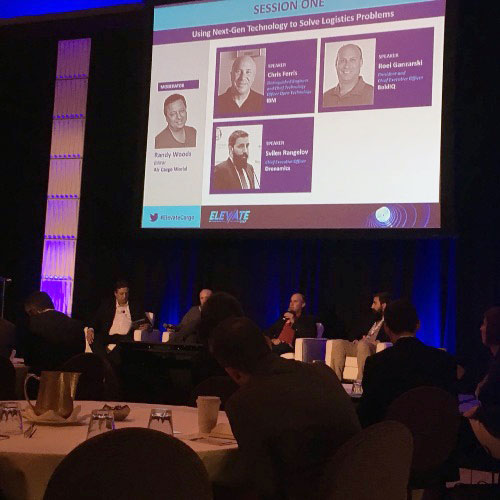Experts address key technology platforms shaping the future of logistics @ Elevate 2017
Posted By: STAT Trade Times – October 04, 2017

Blockchain, Big Data and other cutting-edge next generation technological innovations for logistics were the hot topics of discussion at the recently concluded Elevate 2017 held in Miami. The conference agenda was packed – ranging from best practices for data usage in air cargo to logistics innovation for ecommerce to the future of forwarding but all came together around one overarching theme: the ‘Next Level Innovation in Air Logistics’.
Of the various panel discussions held during the course of the day, the first session, moderated by Randy Woods, Editor, Air Cargo World, had panelists Chris Ferris, engineer and CTO Open Technology, IBM; Roei Ganzarski, president and chief executive officer, BoldIQ and SvilenRangelov, chief executive officer, Dronamics discuss at length on ‘using Next-Gen Technology to solve logistics problems’.
According to Ferris, Blockchain will be the platform for tomorrow. Ferris also pointed out on how cloud would lead the way for ecommerce in the future. Ganzarski ‘s interesting statement on how supply chain should be replaced by demand chain, indicated the urge to have a mindset shift. Rangelov said the movement of cargo using drone is not far away. In his view, the legacy thinking of supply chain is limiting ideas today.
Big data was one of the most discussed topics throughout the panel discussion. The session on ‘Turning big data into intelligence’ had an expert panel consisting Dan Acosta, chief executive officer, Globatom; Spencer Askew, chief executive officer, Teknowlogi ; Andres Perez, director, business intelligence and customer experience, Swiss WorldCargo. The session focused on new ways to collect data (ULDs, trucks, RFID tracking, Internet of Things), using data to predict the future with artificial intelligence, machine learning and quantum computing and on how to maintain data integrity.
The other session on best practices for data usage in air cargo with Gregg Brody, head of carrier success, Elementum; Michael Deittrick, global chief technology officer, travel & transportation industry, DXC Technology; Roland Weil, vice president- sales cargo, Fraport AG and Sara Van Gelder, cargo and logistics development manager, Brussels Airport Company, delved deep into sharing data among cargo communities and the role of the Internet of Things in data-driven solutions.
The panelists had an interesting discussion on the potential to integrate data within the organization and creating an open platform to manipulate and slice and dice data to improve customer service, efficiency and aid supply chain decisions. Almost all of them agreed that the need of the future is to have a transparent platform with all parties connected. Sara Van Gelder mentioned that too much data is not a challenge but the real hurdle lies in not providing the right data representation to stake holders for appropriate proactive and reactive decision and that needs to be tackled. Panelists discussed the need to adopt technology to perform tasks and move people to tasks that require human interface should be the way to change and adopt technology.
The session on ‘Logistics Innovation for e-commerce – Winning the Revolution’ was moderated by Charles Kauffman, deputy editor, Cargo Facts and Air Cargo Management Group. Panelists included Robert (Bob) Imbriani, executive vice president – international, Team Worldwide; Dheeraj Kohli, vice president and global lead, travel and transportation, Unisys; Dhruv Saxena, chief executive officer, ShipBob and Steven Verhasselt, commercial director, Liege Airport.
Saxena mentioned how startups are using the existing e-commerce platforms to jump start business without writing a single line of code, unlike before having to build the infrastructure of e-commerce. Steven mentioned how Flexpress is able to serve the e-commerce providers in a unique way of providing airport services by combining the flexibility of general cargo and the benefit of express market. Panelists agreed that the forwarders need to work with technology companies to integrate the legacy application and link them to e-commerce platforms to gain the benefit of the infrastructure already available. Technology needs to be introduced upfront and considered as an investment instead of jumping into the e-commerce world.
They also discussed the importance of reverse logistics and learn how recovery and return being a part of the logistics world, can move to refusal and return, which is the demand from consumers today.



